- Home
- Peter Grainger
The Rags of Time: A DC Smith Investigation Page 7
The Rags of Time: A DC Smith Investigation Read online
Page 7
‘Yes, John asked him. He said he didn’t know it personally but he’d heard of it from other detectorists. He said he didn’t know that Mark Randall was working it.’
‘So he didn’t hesitate about knowing Randall?’
Waters interrupted – ‘He couldn’t, could he? We’ve got their names together on a written warning sheet from two years ago. They’ve definitely operated together in the past.’
Smith had thought before that Detective Constable Butler was at her most attractive when she was cross. She was staring fixedly at him now, and he said, ‘You’re going to ask me what’s happened, aren’t you?’
Mike Dunn was leaning back in his chair so that she could not see his face, smiling at Smith and at the same time shaking his head in warning.
Smith said, ‘I think we can put Gareth Stone in a field between Lowacre and the Abbeyfield friary a couple of months ago. We have a witness who got up close and personal, and who also had a good look in the back of the van – which contained a load of decorating gear. So he’s fibbed about that, and he’s fibbed about his submersible phone experiences. And isn’t there another witness who can place him at Randall’s place the next morning? Mike, where’s your boss at this moment?’
‘They went out to Worthinghoe.’
‘Someone needs to get on the blower, then, tell him what’s turned up.’
Smith was on his feet already, heading for the door. When he reached it, he turned around and the three of them were still looking at each other, undecided.
‘Preferably today…’
Through the window, as he set off for Detective Inspector Reeve’s office, he could see that it was Waters who had a phone in his hand. Whether he had been volunteered or whether he had seized the initiative was not clear.
‘Just a couple of things, DC. You might as well sit down.’
Oh dear – he needed to be sitting down. This was it, then – she was about to tell him that she was on her way and that a new DI would be doing it all differently from next Monday. Detective Inspector John Wilson? Perhaps he should see Olive again before he left for home, and find out how to fake the symptoms of a heart attack. Or maybe he would have one for real. Either way, it could be curtains at last. Detective Superintendent Allen would hire a marquee and a bouncy castle.
‘First thing. I don’t have the paperwork yet but we’re about to get an answer on Richard Ford from uniform – it should be this week.’
‘Is it what we expected?’
‘Yes. Would you like to break the news to him? You did sort of encourage him a bit.’
‘Yes – I’ll tell the poor sod as soon as it’s confirmed.’
‘Thanks. Second thing. This comes from Detective Superintendent Allen…’
He had known her use other names, less formal ones, for senior officers such as Superintendent Allen in the past, but recently she was using the polite full titles every time – perhaps because she herself was soon to acquire a new one.
Reeve continued, ‘As a professional courtesy, he has been informed that one of his officers might be approached by a law practice concerning a possible seeking of leave to appeal on behalf of their client. The officer concerned is you. I don’t know whether you have any idea which of your many victims might be considering doing such a thing.’
Reeve looked slightly uncomfortable, as if she didn’t actually want to tell him and was hoping that he would guess, as if she would rather not say the name. It would hardly be a guess, though; this was the rumour that had reached him through Jo Evison months ago.
‘Marco Andretti.’
She nodded and said, ‘Any idea what it’s about?’
‘Yes. How did the fourth girl’s body get onto the beach – they’ve looked at this before and couldn’t make it run. At least, that’s my guess. There might be something else but if it was straightforward evidential, it would have come through the force by now. Or it should have done – who knows? Hot new lawyer? Administrative error at the CPS? Shortage of Category 1 prison spaces? Maybe it’s just his turn to have a go.’
‘I don’t think you have anything to worry about. The first three were watertight.’
‘So was the fourth, apart from the fact that by then someone else was involved. The fact that we couldn’t nail them does not put Andretti’s part in it into question. Besides, if they’re only planning to seek leave, no-one else is obliged to participate, least of all me. At least, that’s what the law used to say.’
‘I think you’re right. Superintendent Allen is just letting you know – as a professional courtesy.’
‘Yes. Please pass on my thanks, ma’am.’
She drew a long breath then and said, ‘I was going to let you go until you said that. Now you can bring me up to date on Mark Randall. But don’t be too long. Maggie tells me you have a visit to make on your way home, DC.’
What could he do but look resigned? No man stands a chance against the conspiracy of good women.
Chapter Six
This was a new face. It stayed further away than the other two, and it hung above him for a long time without making any noise. The eyes were a different colour, lighter, but they stayed on him, looking back into his own until he stopped moving his hands and stopped calling for her. After a time he reached up towards it but it wouldn’t come any closer and then he could hear the other voices, the familiar ones, making the pleased sound and so he smiled at the new face because it must be safe.
She said, ‘Well, DC?’
The face looked away for a moment and said to them, ‘Well, it’s definitely a baby.’
There were shouts, loud noises that ended the smile but the face was still there, and then it looked back at him and made more noises.
‘And I’ve definitely seen worse-looking ones.’
She appeared then and began to fuss over him, and the new face went away.
John Murray said, ‘If you could drop in about this time every evening for the next few months it would be a big help. He stopped crying as soon as you looked at him, DC.’
Smith acknowledged that he probably did have some sort of unexplained power over small children and dogs but Maggie Henderson, still at the cot, said that the poor mite was probably just frightened that he would be charged if he did not fall silent.
‘And that’s good as well,’ Smith said, ‘They should all be taught that they have the right to remain silent and that it’s often a very good idea to exercise it.’
She shook her head, smiling down at William David Murray, pretending to be rearranging the little blue blanket so that she could touch him again. Smith had sensed the transformation beginning in her months ago but now it was complete; she was no longer a detective constable who was having a baby – she was a mother who used to be a detective constable. Once upon a time, he would have been annoyed for a moment or two because Maggie had been a very safe pair of hands, someone who could bring a different set of skills to bear, especially in the interview room, but now, after Belfast… Well, things change in unexpected ways. He would not be surprised if she never came back to Kings Lake Central. Being a mother and police is never easy, even when the children are older – she might find something more compatible, so that she could be there when he came home from school, that sort of thing. It was not a sacrifice but a simple re-ordering of priorities, as Detective Superintendent Allen might say. John and Maggie already knew that William David would be their only child – the doctors had made that very clear.
When John Murray moved away into the kitchen to pour the tea, Smith followed him.
‘So dad – how does it feel now?’
‘The same as I said in The Lighterman’s, only more so. There was this gap in your life that you didn’t know was there - I’m talking about the bloke’s point of view, because women always know it’s there, I’ve realised that… Anyway, there’s this gap, you don’t know it’s there and then something fills it. And you can’t ever go back, you can’t even imagine doing that. I don’t know how men leave their families, t
heir kids, I… Sorry.’
‘Why? I’ve dealt with worse parent-bores than you’ll ever be, John. Of course, Maggie might turn out to be the worst but we’ll cross that bridge when we come to it.’
Murray laughed and said that he would be sure to let her know what Smith was prepared for, but there was something else, something in the way that he was not willing to make eye contact that made Smith pursue it as if Murray was a suspect. And eventually John Murray said, ‘I don’t want to go on about it, DC, because I know it’s something that you and Sheila struggled with. I know you tried for years and we didn’t, it was just accidental, completely out of the blue, and – it doesn’t seem fair. We’ve talked about it, Maggie and me – you and Sheila would have been great parents. I suppose this has made us realise what other people miss out on. We’re sorry it didn’t happen for you.’
Murray could go for whole days at the station without saying half as many words as that, and he frequently did so. Hormones, Smith concluded, are the strangest things, but he knew too that there was more to it, he could see that there was more to it now that Murray was finally looking at him, and waiting for some sort of response. In all the world there was no more than a handful of people that he might tell about what he had found in Belfast, and two of them were here in this apartment with him now. There was a moment then when he thought he might do so, when the idea of doing so excited him, and then he knew that this was not the time.
‘John, when it comes to the big things – like that tiny little thing in there – I’ve learned that the only sensible approach is que sera. And all manner of thing shall be well – that too.’
‘Things?’
‘No, thing. It was one of Sheila’s favourite quotations. Don’t ask me where it comes from, I don’t have a clue. But it always breaks the ice at parties.’
‘Yes, DC – I can see it going down a storm…’
‘So, moving on, what’s next for the Murray-Hendersons?’
‘Ah… Funny you should say that. We might, you know…?’
‘Not really. Hyphenate your surnames?’
‘Not exactly. Now that William’s here we thought we might, you know, for his benefit… It would make the legal stuff easier if we – tied the knot.’
Smith seemed to stagger a little and placed a hand on the kitchen table to steady himself.
‘Good God, man. I know you’ve just had a baby but keep a sense of proportion. Marry the woman? You hardly know her. Obviously I’m not talking in the biblical sense there but…’
Murray was pouring the milk into the tea – he knew Smith’s views on this matter but the hormones had affected his memory as well – and looking down with a smile.
Smith said, ‘Seriously, John, congratulations. When do I get to kiss the bride?’
Nick the postman had pushed a card through his letterbox. It was the usual tick-box thing but on the back he had written ‘Hello Mr Smith, package round the back at your conservatory door’. Ten pounds in an envelope at Christmas and you receive executive service all the year round; as a uniformed officer, Smith had learned from more experienced hands that people like postmen, paper-boys and milkmen – now almost extinct, of course – were priceless sources of information and the habit of cultivating them had never left him. And besides all that, Nick was a good sort.
It was a well-padded envelope, not quite A4 in size, and there was a Northern Ireland postmark. He took it into the kitchen and felt around it with some care, but he had already guessed what it must be, and so he slit one end open with a filleting knife. Lia Wisbey had kept her word, and more. The photograph had been covered in bubble-wrap which had been sellotaped in place; he cut through that as well with the point of the blade and then the frame was in his hands, a good, proper, heavy silver frame. On her phone she had captured that brief moment when he stood with Cati and Diarmuid on the hill at Gleann Beag, and they were smiling, Cati and Diarmuid, as they talked about Brann O’Neill – what he had been and what he would have become. Lia had captured those few seconds in which the three of them had been close on the green hillside under the blue Irish sky, and she had sent the moment to him as she had promised – a small compensation perhaps for what he had agreed to do in that final phone call with her, but a compensation nonetheless.
He stood it first on the breakfast bar in the kitchen but that could not be its permanent home. Then he went into the lounge and it looked promising on the low shelf beside the fireplace but this room already contained pictures of Sheila and himself, and of Sheila alone. She had never met him, Diarmuid, of course, and it was too late now. An old song came into his mind, his mother singing it in her fine contralto voice that no-one but her family ever heard – a song by the crooner Jim Reeves called ‘When Two Worlds Collide’. Finally, he took the picture upstairs into his music room, cleared a small shelf of manuscripts and song-books and gave the frame pride of place in the centre of it. They were still smiling on the sunny hillside in County Meath, and always would be, thanks to Lia. Smith picked up his Taylor acoustic then, sat on the stool facing them and played from memory the chords of ‘Raglan Road’, humming the melody quietly and remembering the words - on a quiet street, where old ghosts meet, he could see her walking now.
Downstairs he made himself a Spanish omelette the proper way, cooking the new potatoes and onions slowly in an expensive olive oil for half an hour before adding the eggs and the chopped flat-leaf parsley, spending several minutes with the pan shaping the mixture into the required cushion of deliciousness. Living alone, it was too easy to snack, to eat out of packets, to cook only the simplest of things – periodically he had to straighten his back and give himself a good talking to about this. It was exactly like weight-training; afterwards the sense of virtue and the determination to carry on like this in future, forever and forever – or at least until life gets in the way again.
He had managed to watch the first half of a documentary about the tragedy of Greece and the euro when Waters called him with the news that Gareth Stone had been arrested about an hour ago. Stone had gone to Kings Lake Central unwillingly to answer further questions – when he attempted to assert his right to leave, Wilson had detained him as being under suspicion of involvement in the murder of Mark Randall. Wilson had told Mike Dunn that the news that Stone could be placed near Abbeyfield a couple of months ago after he had denied yet again that he had ever been there had been very useful – key in his decision to arrest Gareth Stone. Waters thought that Smith would like to know that.
Smith said, ‘Good. Just a bit of routine plodding, but you should get some of the credit for it. You should contact Steven Harper in the morning and warn him that his identification evidence probably will be required – DI Reeve might even favour an old-fashioned line-up.’
Smith hadn’t felt that this was his case from the start but he could not help going through the obvious now that Waters was on the phone.
‘Do you know if Stone made his telephone call?’
‘Yes. He called his wife.’
‘Right. If it were me, I’d have put some eyeballs on her this evening.’
‘That’s where Mike was – still is, as far as I know. He said there was no sign of anything unusual. No bonfires or people turning up.’
‘Good. And I assume that everyone is going to be busy turning the place over early tomorrow morning?’
‘Mike says so. He thinks we’ll all be involved – or at least, Serena and I will be. All hands on deck, that sort of thing.’
The smile on Smith’s face was a fleeting one; that’s why Waters had called, breaking the news to him gently. But he really didn’t mind Wilson taking his people again. Wilson had done it as Smith would have done, delaying the arrest so that his twenty four hours gave him as much daylight as possible tomorrow. And, of course, in these situations the arresting officer wants as much certainty as he can get – arrests can be, and sometimes are, tactical but nobody wants to get into the habit of de-arresting suspects. Stone seemed to have told too many
lies and Wilson had made a good call as far as Smith was concerned.
During the pause in the conversation, he had heard another voice in the background - a female voice in another room. Smith listened harder and it came again, this time calling Waters’ first name in a lazy and rather seductive way. Smith looked at his watch - nine pm - and said, ‘So, if you’ve got an early start, hadn’t you better get back to bed?’
There was a short intermission while Waters worked out what must have just happened and probably blushed. Then he said, ‘So what time are you in tomorrow, DC?’
‘Eight o’clock.’
‘I think there’s an early briefing.’
‘Eight o’clock unless I hear differently.’
‘OK. I’ll see you then.’
‘Yes.’
Waters still could not quite end the call for some reason. Katherine Diver might do the job for him if he wasn’t careful, and so Smith said, ‘Try and get some sleep’ and pressed the red button himself. Waters had taken a gamble with his career and had something to prove; he didn’t need too many distractions, especially tall, blonde, assertive ones. Smith thought back to being twenty three and at first it seemed to be only twenty five mile yomps over Scottish mountains and dropping from helicopters into dark Norwegian fjords but then, thinking about it, there had been night-time exercises of other kinds, too. As long as he didn’t actually fall asleep while on duty, Waters was bright enough to survive, and if there were more serious concerns, Smith could always have a word with his dad, with whom Smith had a standing invitation to play snooker at the family mansion. Doing that – having a word – was unlikely, of course, but like it or not, other people’s lives grow up around us like briars and sometimes we cannot help getting caught up in them.
He wouldn’t be late to bed himself then, in case there was an early start and a long day ahead. In the music room he looked again at the photograph and wondered whether he should go to Brann O’Neill’s funeral after all – if he did so, there would be complications and he had to be honest with himself about why he might be going. Would it be to say goodbye to an old, old friend or to say hello to someone else? In sending the photograph, Lia Wisbey had kept her part of the bargain, and now, surely, he must do the same.

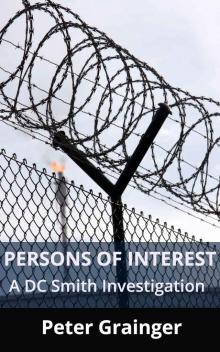 Persons of Interest
Persons of Interest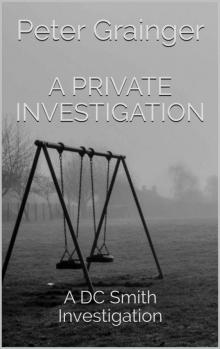 A Private Investigation
A Private Investigation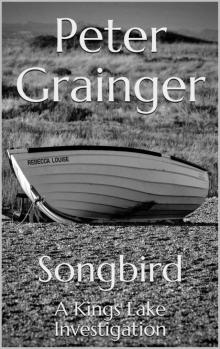 Songbird
Songbird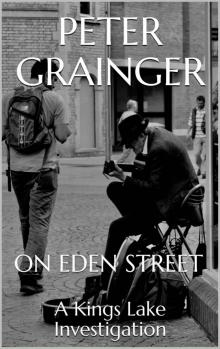 On Eden Street
On Eden Street An Accidental Death
An Accidental Death Time and Tide
Time and Tide An Accidental Death: A DC Smith Investigation
An Accidental Death: A DC Smith Investigation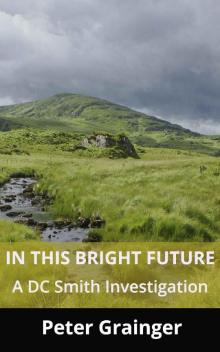 In This Bright Future
In This Bright Future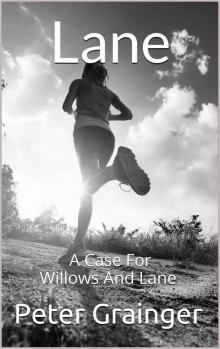 Lane: A Case For Willows And Lane
Lane: A Case For Willows And Lane The Rags of Time: A DC Smith Investigation
The Rags of Time: A DC Smith Investigation Luck and Judgement
Luck and Judgement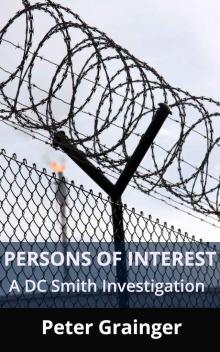 Persons of Interest: A DC Smith Investigation
Persons of Interest: A DC Smith Investigation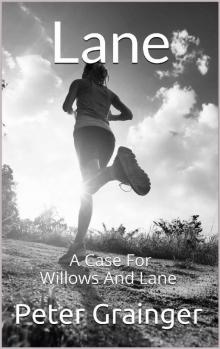 Lane
Lane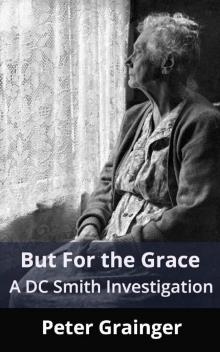 But For The Grace
But For The Grace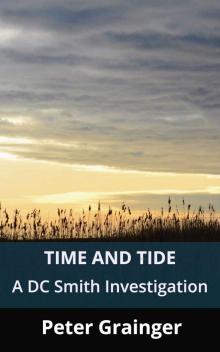 Time and Tide: A DC Smith Investigation
Time and Tide: A DC Smith Investigation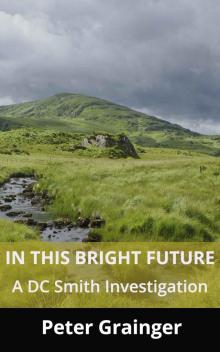 In This Bright Future: A DC Smith Investigation
In This Bright Future: A DC Smith Investigation The Rags of Time
The Rags of Time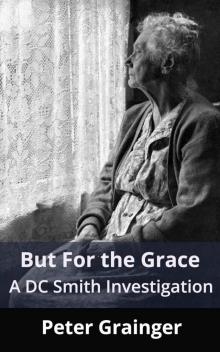 But For The Grace: A DC Smith Investigation
But For The Grace: A DC Smith Investigation Luck and Judgement: A DC Smith Investigation
Luck and Judgement: A DC Smith Investigation